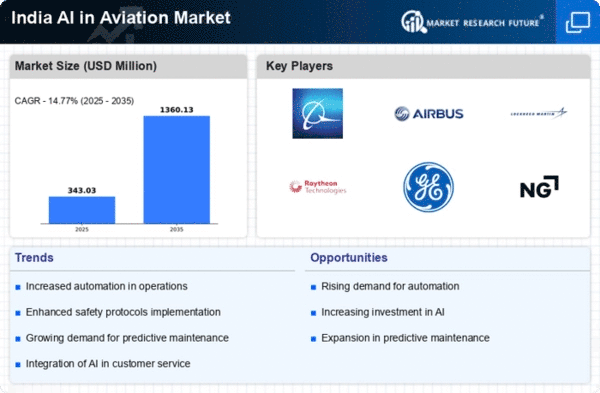Rising Passenger Expectations
As air travel becomes more accessible, passenger expectations are evolving rapidly. The ai in-aviation market is responding to this trend by offering personalized services and enhanced customer experiences through AI technologies. Passengers now expect seamless check-in processes, real-time updates, and tailored travel recommendations. Airlines that leverage AI to meet these expectations can potentially increase customer satisfaction and loyalty. Market analysis suggests that airlines implementing AI-driven customer service solutions may see a 30% increase in positive passenger feedback. This shift in consumer behavior is likely to drive further investment in AI technologies within the ai in-aviation market.
Regulatory Support for AI Integration
The Indian government is actively promoting the integration of AI technologies within the aviation sector. This regulatory support is crucial for the growth of the ai in-aviation market. Initiatives such as the National Civil Aviation Policy aim to enhance operational efficiency and safety through technological advancements. The government has also established frameworks that encourage investment in AI solutions, which could potentially lead to a market growth rate of around 15% annually. Furthermore, the establishment of clear guidelines for AI implementation ensures that stakeholders can navigate the complexities of technology adoption, thereby fostering a conducive environment for innovation in the ai in-aviation market.
Collaboration with Technology Providers
Collaboration between airlines and technology providers is emerging as a vital driver for the ai in-aviation market. Partnerships with AI firms enable airlines to access cutting-edge technologies and expertise, facilitating the rapid deployment of AI solutions. These collaborations can lead to the development of innovative applications, such as AI-based flight planning and predictive maintenance systems. The potential for shared resources and knowledge exchange is likely to enhance the overall efficiency of operations. As more airlines engage in such partnerships, the ai in-aviation market is expected to witness accelerated growth, driven by the integration of advanced technologies.
Growing Demand for Operational Efficiency
The demand for enhanced operational efficiency in the aviation sector is a key driver for the ai in-aviation market. Airlines and airports are increasingly seeking AI solutions to optimize their operations, reduce costs, and improve service delivery. For instance, AI can streamline flight scheduling, baggage handling, and maintenance processes, leading to significant time and cost savings. It is estimated that AI-driven operational improvements could reduce operational costs by up to 20%. This growing emphasis on efficiency is likely to propel the adoption of AI technologies, thereby expanding the ai in-aviation market in India.
Investment in AI Research and Development
Investment in research and development (R&D) for AI technologies is a significant driver for the ai in-aviation market in India. With increasing funding from both public and private sectors, the focus on developing AI solutions tailored for aviation is intensifying. Reports indicate that R&D expenditure in the aviation sector is expected to reach approximately $1 billion by 2026. This influx of capital is likely to accelerate the development of advanced AI applications, such as predictive analytics and machine learning algorithms, which can enhance operational efficiency and safety. As a result, the ai in-aviation market is poised for substantial growth, driven by innovative solutions emerging from these investments.
















